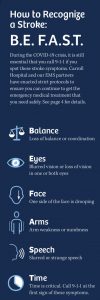Westminster resident Lisa Thorne was getting dinner ready on the night of July 29, 2019 when she forgot how to do something she had done a million times before.
“My husband John recalls that I opened and closed the microwave door a few times—as if I suddenly didn’t know how to operate it,” she tells us today. “When he walked over to check on me, I turned toward him and just started to fall.”
It was a moment that could have changed her life forever, if not for her husband’s smart—and fast—response: he called 9-1-1 and told the operator that he believed his wife was having a stroke.
“In stroke care, we say that time is brain. So calling 9-1-1—rather than driving to the emergency department (ED) or laying down to see if it will pass—is perhaps the most important thing you can do if you suspect someone is having a stroke,” explains Sandra Ruby, M.D., medical director of the stroke program at Carroll Hospital, which is state certified to care for emergency stroke patients. “That call triggers a chain of alerts between the EMS responders and our hospital to ensure that our emergency stroke team is ready before the patient even comes through the door.”
For Thorne, there is no doubt the system works. “We only live seven miles away from the hospital, but the ED team was already waiting for me when I got there,” she says. “It was clear they were running a protocol and that each person had an exact job they were supposed to do.”
Within minutes of her arrival, Thorne received tPA (tissue plasminogen activator), a medication that dissolves the stroke-causing clot in the brain. The effects were almost immediate. “Every 15 minutes I got better and better,” Thorne recalls. “By the time I was admitted into the critical care unit, I was, in my mind, almost fine, almost back to normal.”

While Thorne’s diagnosis and treatment were, fortunately, relatively textbook, Carroll Hospital is also equipped to deal with the most complex stroke cases, thanks to its partnership with Sinai Hospital.
Carroll Hospital and Sinai Hospital’s stroke specialists review patients collaboratively in real time via phone- or video- enabled telemedicine with equipment funded by the Carroll Hospital Foundation. In the rare instance that advanced care is required, patients are immediately transferred to Sinai’s Thrombectomy-Capable Stroke Center.
“We are so fortunate to have Carroll Hospital as a certified primary stroke center in this community, so that people like me don’t lose precious time traveling to get the care we need,” Thorne says. “The long and short of this is that I survived my ordeal by the grace of God and the staff at Carroll Hospital. They have all my gratitude.”
From the summer 2020 issue of A Healthy Dose, Carroll Hospital’s community magazine.